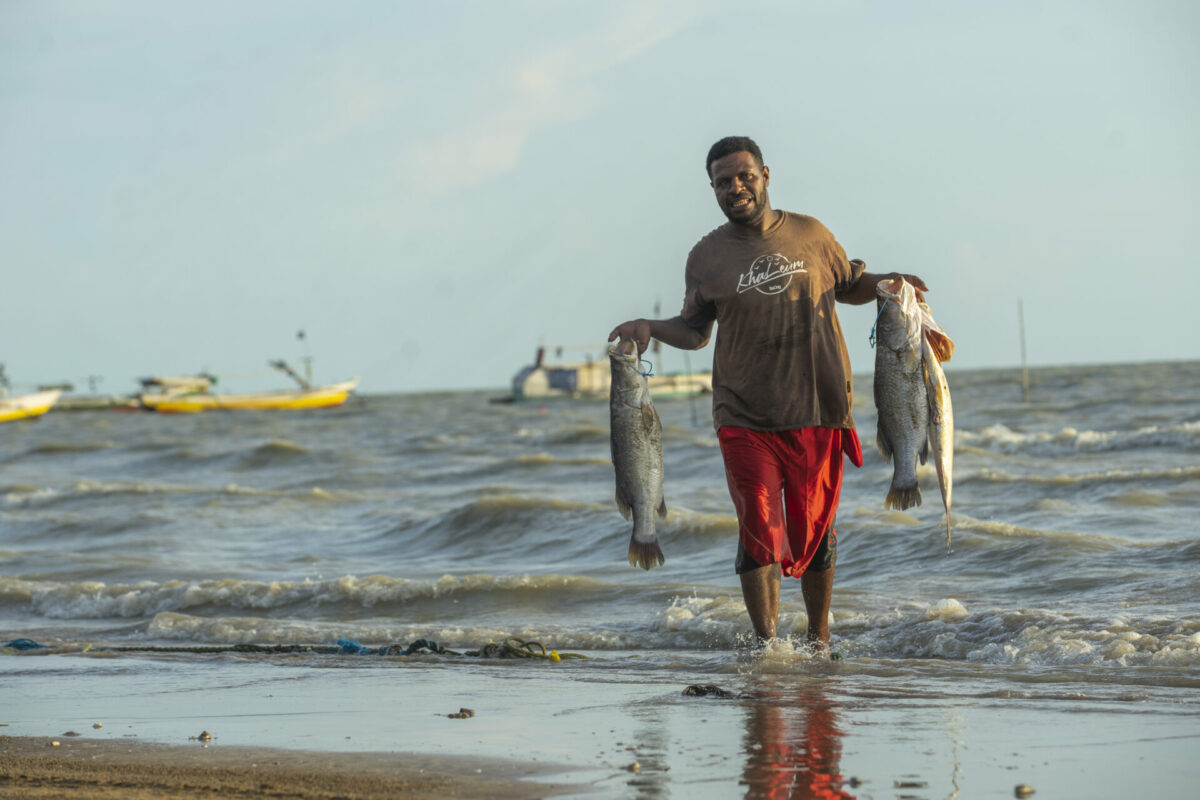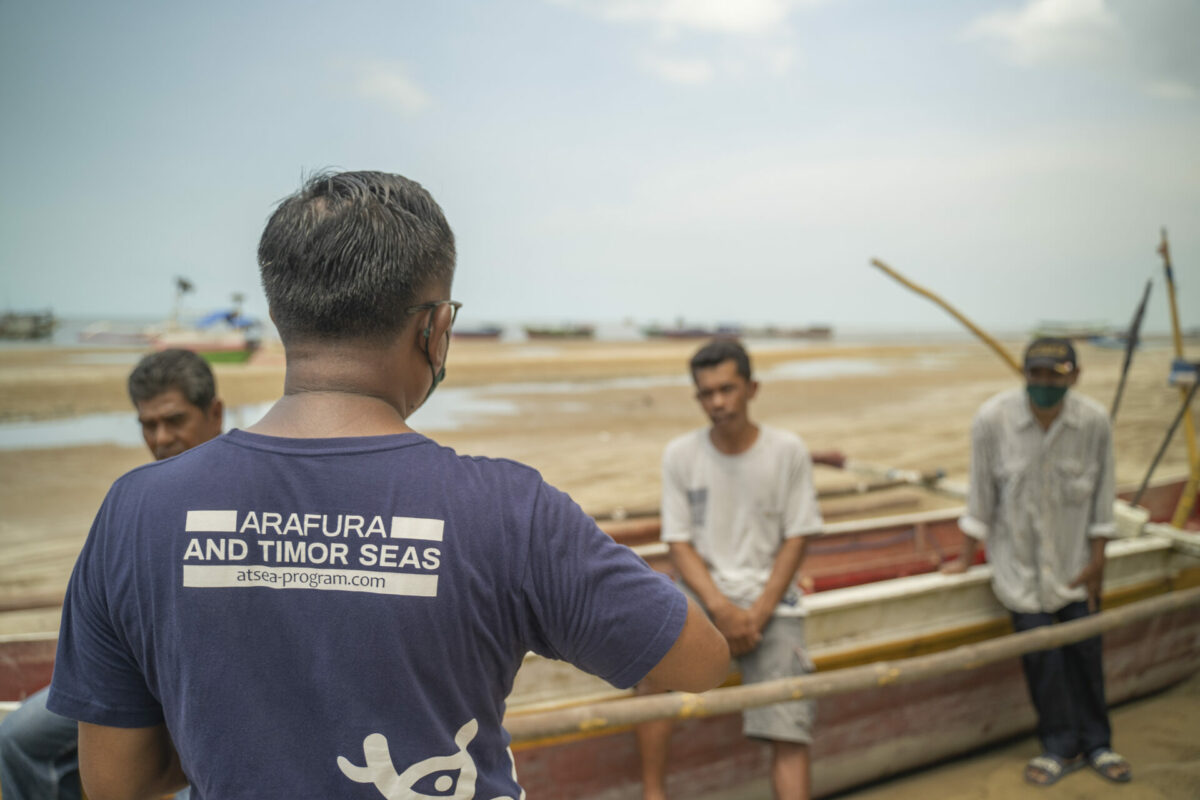The International Day for the Fight against Illegal, Unreported and Unregulated (IUU) Fishing was celebrated on 5 June 2023. This was followed by World Ocean Day on 8 June 2023. These two important events helped to bring the importance of our work into focus, highlighting the need for collaboration in safeguarding our oceans, while also reiterating the critical challenges these efforts continue to face.
International cooperation is essential to effective ocean conservation. Countries in the Arafura and Timor Seas (ATS) region, including Australia, Indonesia, Papua New Guinea and Timor-Leste, have joined forces through the ATSEA-2 Project and are working to combat IUU fishing, protect valuable fisheries resources and mitigate marine pollution.

The ATSEA-2 Project, in collaboration with the Regional Plan of Action to promote responsible fishing practices, including combating IUU Fishing (RPOA-IUU), plays a leading role in addressing the urgent issue of illegal fishing in the ATS region. Immediate action is needed to prevent further depletion of fish stocks and ensure the long-term sustainability of fisheries. Managing shared resources and overlapping maritime boundaries poses a challenge to effective fisheries management and enforcement; a problem exacerbated by illegal fishing activities that disregard regulations and hinder regional cooperation.
In addressing these challenges, the ATSEA-2 Project and the RPOA-IUU place an emphasis on collaboration, information sharing and capacity building in regard to the monitoring and control of illegal fishing. Together, we aim to strengthen governance, promote responsible fishing practices and ensure sustainable resource management. Illegal fishing not only affects the environment, but also has socio-economic impacts on coastal communities that rely on fisheries. By tackling illegal fishing in the ATS region, we can also protect the marine environment, preserve biodiversity and promote sustainable economic development.
Addressing marine pollution, particularly from abandoned fishing gear, is a crucial part of the work undertaken by the ATSEA-2 Project and our partners. By implementing effective waste management systems, raising awareness about the issue and promoting proper waste disposal, we are taking steps to combat plastic pollution and moving towards the realisation of a more circular economy for maritime industries and fisheries activities.
Another major threat to the ATS region is oil spills, which can have severe consequences for the marine environment. By improving regional coordination, implementing best practices and raising awareness about oil spill prevention and response, the region can reduce the ecological impacts of such incidents. Collaborative efforts among nations in the region will build their capacity to prevent and effectively respond to oil spills, thereby minimising the impact of these disasters on marine life and coastal communities.
In addition, it is crucial to prioritise the conservation of endangered, threatened and protected (ETP) species and establish Marine Protected Areas (MPAs) in the ATS region. Once again, in managing the transboundary or migratory populations of ETP species and implementing agreed-upon plans effectively, regional cooperation is vital. With clearly designated and properly managed MPAs, the ATS region can create protected areas that safeguard biodiversity and critical habitats, while also supporting the continued productivity of sustainable fisheries.

The ATSEA-2 Project’s mission in the ATS region is focused on transboundary collaboration; catalysing social, ecological and economic progress through partnerships centred around the blue economy. These efforts acknowledge the inseparable linkages between a healthy marine environment and human well-being; by promoting responsible fisheries, tourism and renewable energy, ATSEA-2 supports the livelihoods of coastal communities, while also ensuring the long-term sustainability of marine resources.
Finally, mainstreaming Gender Equality and Social Inclusion (GESI) is needed to ensure women and men participate in and benefit from conservation efforts equally. Empowering coastal communities, including Indigenous groups, to be actively involved in marine conservation initiatives ensures that diverse perspectives and traditional knowledge are taken into account in decision-making processes. By addressing the specific challenges faced by women and marginalised groups in the ATS region, the ATSEA-2 Project strives to create a fairer and more sustainable future for everyone.
It is clear that the ATS region continues to face a number of pressing transboundary issues, each of which will demand collaborative efforts from various stakeholders and government bodies. The ATSEA-2 Project, in collaboration with the RPOA-IUU, is taking the lead in combating IUU fishing and marine pollution. By fostering collaboration, supporting the expansion of MPAs, embracing regional partnerships and promoting GESI, ATSEA-2 continues working to tackle these challenges. Ultimately, through collaboration and tireless commitment to our cause, these efforts will help to ensure sustainable resource management, and preserve the health and vitality of our oceans for generations to come.
This article is also published at IW:Learn
By Stella Yovita Arya Puteri


